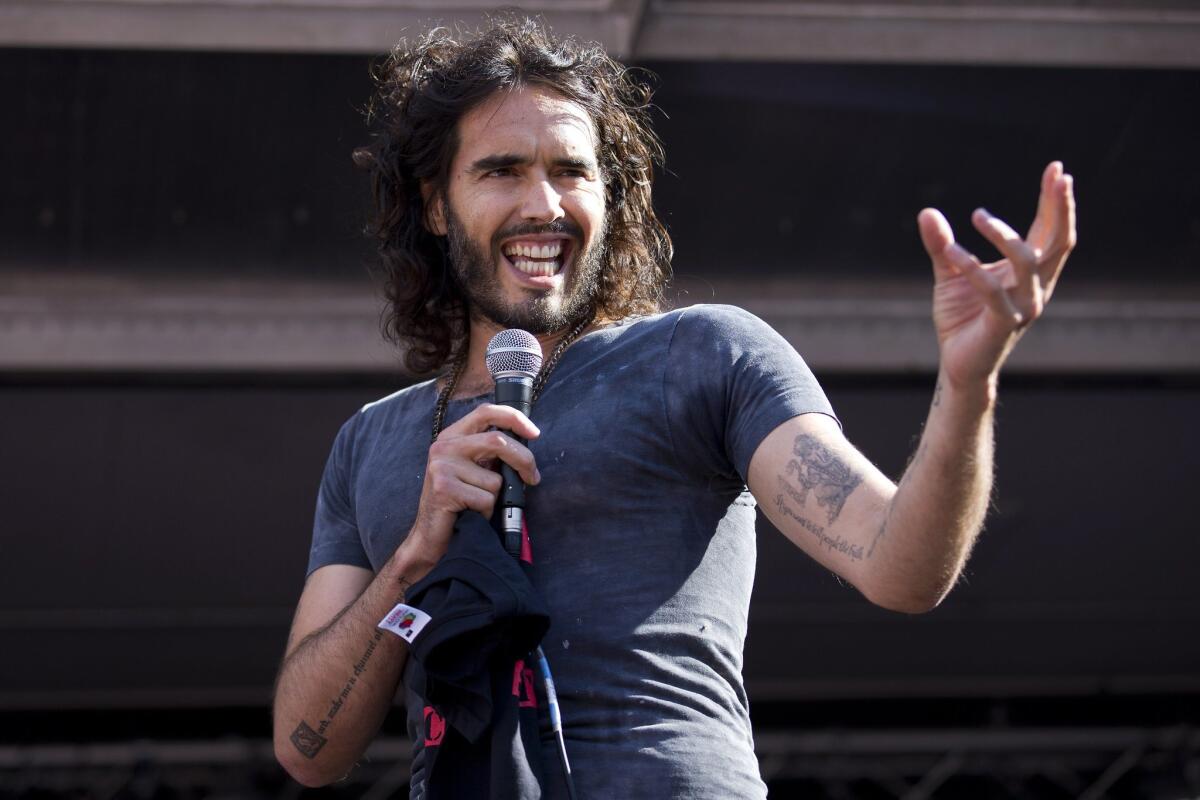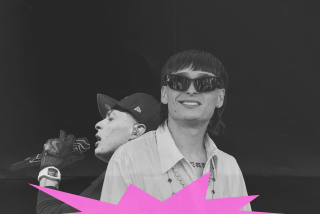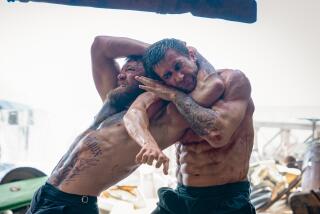‘Brand’ doc director reveals why comedian didn’t show up for SXSW

Dear Ondi,
Happy Valentine’s Day. Well done on everything.
Russell
That was the last she’d heard from him. A card on a bouquet of flowers he’d sent to her hotel room while she was traveling in Bhutan.
And then nothing. For a month. Until Friday, when “Brand: A Second Coming” was set to premiere at the South by Southwest film festival. That’s when Ondi Timoner heard that after months of trying to come to terms with her documentary about him, Russell Brand would not be flying here to support the film.
He posted a letter on his website, saying that watching the film made him “very uncomfortable”; that he’d found it “oddly intrusive and melancholy.” But he said nice things about Timoner too -- that she was a “very beautiful person and a director of peerless integrity.”
Timoner was gutted, but she wasn’t surprised. She knew Brand was struggling with the film. She’d given him a cut of it to watch in November, but he waited until January -- after the movie had already been accepted to SXSW -- to watch it. Then, on a Jan. 15 conference call, he told her what he thought of it.
FULL COVERAGE: South by Southwest
“He said to me, ‘I’d say great [expletive] film, mate, except that it’s about me. And I never wanted a film about me,’” Timoner, 42, recalled. “And I’m like, ‘Why wouldn’t you want a film about you? You’ve written books about you. You do standup about you. But here I am doing that, and that’s a problem?’ I was so disappointed.”
Following the premiere of her film here late Friday, Timoner ordered a Patron and sat down on a couch. She took off her high heels and tucked her legs underneath her, still wearing the sparkly mini-dress she’d bought at a consignment shop for the event. She’d taken a long time to get to the interview because so many people on the street had stopped to ask her to take selfies.
As a documentarian, Timoner is no stranger to moody interview subjects. In “Dig!”, her breakout film that won the Grand Jury Prize at Sundance in 2004, she detailed the contemptuous relationship between the frontmen of the Dandy Warhols and the Brian Jonestown Massacre. With “We Live in Public” five years later, she profiled a dot-com millionaire as a way of examining the Internet’s effect on our private lives. (That film went on to win the same high-profile prize at Sundance.)
But Brand was another story altogether. For one thing, a documentary about the comedian had already been in the works for five years when Timoner came to the project. Initially, Brand had been courted by Albert Maysles and Oliver Stone -- yes, seriously -- to collaborate on a documentary.
“Maysles was, like, operating camera,” Timoner said of the legendary filmmaker who died earlier this month at 88. “Russell says it was like ego candy.”
But the project quickly fell apart. (Brand, by the way, did not respond to numerous emails this week requesting that he talk about the documentary.) Other filmmakers, including “The King of Kong” director Seth Gordon, replaced him. By the time Timoner got to the movie in 2012, she was the sixth director to work on it.
Brand’s team had sought her out to see if she could save the movie, which at first, Timoner wasn’t even sure she could do. She watched a rough cut in which Brand traveled around the world, talking to famous people like Mike Tyson, David Lynch and Cameron Diaz about happiness.
“He was like leaning into Pink, asking about her life and stuff,” Timoner said. “I felt like I was watching privileged people say ‘woe is me’ and talk about what it really takes to have a meaningful life. And I just don’t want to hear from them about that.”
She decided she didn’t want to direct the movie, but still met with the filmmaking team to give them advice on how they might be able to improve it. They needed a solid interview with Brand, for one. They needed to trail him. They needed to find out why he was so inspired by Gandhi and Che Guevara, some of the figures who had influenced his turn away from Hollywood toward political activism.
But when she showed up at the Soho House to impart her ideas to the team, Brand was there. And she liked him. He was smart and charming, which she hadn’t realized from the footage she’d seen.
By the time she left the parking lot, he’d already emailed her: “I’m enchanted.” So she changed her mind.
But filming wasn’t easy. The first time she went to his house to interview him, she couldn’t find him. His manager tried to force him to sit down with her, but he refused, instead opting to go out to the pool with comedian Simon Amstell. He didn’t want her to do observational shots, either -- of him riding his bike around London, or traveling in the car to his hometown in Essex.
“He was controlling it,” she said. “At one point, I said, if you’re not gonna let me shoot traveling then I don’t have time in my schedule to do this. I don’t know who’s been filming you before, but I have a child. I have a lot of stuff going on. If I can’t cover what I need to cover, then I can’t do it.”
Begrudgingly, Brand acquiesced, signing a release that gave Timoner control of the final cut.
The result is a film that focuses largely on the 39-year-old’s recent disillusion with fame and turn to social revolution. The movie explores how -- after starring in a handful of box office comedy hits and divorcing Katy Perry -- he moved back to London and began pushing his belief in a more egalitarian society.
He’s no longer interested in red carpets and big houses and leather boots. Real fame, the film implies, belongs to those who make lasting social change -- and that’s what Brand now craves.
Which is why it’s somewhat surprising that in his letter on Friday, Brand said most of issues with the film had to do with how difficult it was to relive his past.
“My life was hard enough the first time round,” he wrote, “and going through it again was painful and sad.”
But there isn’t actually that much about Brand’s early struggles in the film. He returns to his economically depressed hometown, and he does talk about his drug addiction -- though not in any serious depth.
There’s footage of him smoking heroin that was made public a couple of years ago, and a disturbing scene at the Edinburgh Film Festival where he smashes a glass bottle into his stomach while high and starts bleeding.
There’s also not much said about his relationship with Perry. She’s shown traveling a lot on her “Teenage Dream” world tour -- which was documented in her own 2012 concert film. And at one point Brand interviews his then-wife, during which she tells him that she’s worried that he’ll become like Buddha and leave her behind in lieu of his greater mission.
“You’re a genius. You make me look good,” the pop star says. “You don’t have to give it all away to look good.”
“My subject, who I respect -- who trusted me -- was coming apart at the seams over this stuff and feels very protective over his ex-wife,” Timoner explained. “He has never trashed her and he didn’t want to start now. Ironically, some of the footage was beautiful -- and it made me really sad not to be able to include it because I think it demonstrated the love they shared and that it was authentic.”
But even after Timoner removed the Perry scenes, Brand wasn’t happy. He thought he wasn’t funny enough in the movie. He asked her to add another 30 minutes of his stand-up material. She added 9 minutes. Obviously, he still felt uncomfortable.
So he didn’t show up at SXSW. But Timoner says she isn’t mad at him. She gets it -- that it was hard for him to look at his down moments, to be vulnerable and unsure of himself and his mission.
“I think he cares a lot about what he’s doing right now -- the ordinary man and truth under power -- and doesn’t want anything to derail his mission. He thinks this might because it shows him in a vulnerable way,” she said. “I tried to explain that we wouldn’t relate to him if he was just winning all the time. But I think it was really hard for him to accept that people were going to see things about him that weren’t attractive.”
Follow @AmyKinLA for more news from SXSW
We’re at South by Southwest until March 22. Join us at latimes.com/sxsw for ongoing coverage of the festival.
More to Read
Only good movies
Get the Indie Focus newsletter, Mark Olsen's weekly guide to the world of cinema.
You may occasionally receive promotional content from the Los Angeles Times.







